Janice Hardy's Blog, page 27
March 15, 2021
4 Ways a Strong Point of View Strengthens a Novel
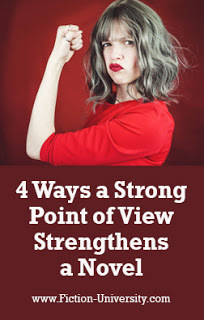 By Janice Hardy, @Janice_Hardy
By Janice Hardy, @Janice_Hardy Point of view is one the most valuable tools a writer has.
I think at some point in their writing journey, every writer goes looking for the “secret” to writing. Is it the perfect writing template? A members-only plot generator? The ultimate list of words to cut from our manuscripts?
Nah.
It’s point of view.
I’m a huge believer that mastering point of view (POV) will solve 99% of common writing problems. If a writer understands POV, then showing comes naturally, description is easier to write, character goals are clear, the stakes are personal, and thus stories feel more organic.
POV is all about being inside the character. To be inside a character you have to understand that character, and once you understand them, writing them becomes easier.
Continue ReadingWritten by Janice Hardy. Fiction-University.com
Published on March 15, 2021 04:45
March 13, 2021
WIP Diagnostic: Is This Working? A Closer Look at a Short Story Opening Page
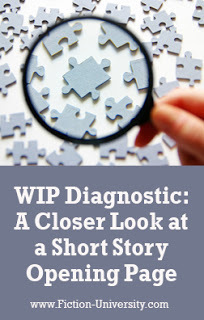 Critique by Janice Hardy, @Janice_Hardy
Critique by Janice Hardy, @Janice_HardyWIP Diagnostics is a weekly column that studies a snippet of a work in progress for specific issues. Readers are encouraged to send in work with questions, and we diagnose it on the site. It’s part critique, part example, and designed to help the submitter as well as anyone else having a similar problem.
If you're interested in submitting to WIP Diagnostics, please check out these guidelines.
Submissions currently in the queue: One
Please Note: As of today, critique slots are booked through March 20.
This week’s questions:
1. Does it draw you in?
2. Would you want to know more about Jeff and his goal to reach Abby?
3. Also, is the specific mention of Biosphere 2 and Celebration, FL helpful to understanding the type of town that Nathan Stotfold created or confusing?
Market/Genre: Short Story
On to the diagnosis…
Continue ReadingWritten by Janice Hardy. Fiction-University.com
Published on March 13, 2021 05:17
March 12, 2021
Story Structure: How the Act Two Disaster Works in a Novel
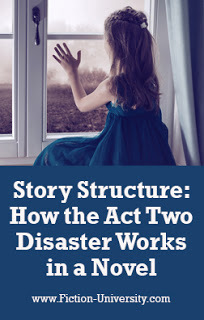 By Janice Hardy, @Janice_Hardy
By Janice Hardy, @Janice_Hardy The act two disaster shows readers what your protagonist is truly made of.
Since I enjoy putting my characters in terrible situations, the act two disaster is always a lot of fun to write. Writers who want to protect their characters probably won’t find it so entertaining, but remember—this is the moment that allows your poor protagonist to become the person they want to be. So it’s good for them.
All through the middle the protagonist has been trying and failing, feeling the pressure, ignoring their flaw and the lessons the plot has been trying to teach them all book. Just when things are the most dire, something happens that causes catastrophic failure—often something they did, or didn’t do but should have. (Adjust this to fit the scale or scope of your story. What’s catastrophic in a science fiction epic is different from what’s catastrophic in a romance).
In cliché speak, it’s the darkness before the dawn. It all becomes too much and the protagonist feels like giving up, but finds the strength to carry on. They realize the only way to succeed is to face the problem head on and do what they’ve been scared to do all along.
Continue ReadingWritten by Janice Hardy. Fiction-University.com
Published on March 12, 2021 03:00
March 11, 2021
Want to Write Unforgettable Characters? Do this One Thing.
 By Angela Ackerman, @AngelaAckerman
By Angela Ackerman, @AngelaAckermanPart of The How They Do It Series
JH: Quick—who are your favorite characters? Do you know why you love them so much? Angela Ackerman does, and she shares how you can write characters your readers will never forget.
Angela Ackerman is a writing coach, international speaker, and co-author of the bestselling book, The Emotion Thesaurus: A Writer’s Guide to Character Expression and its many sequels. Available in eight languages, her guides are sourced by US universities, recommended by agents and editors, and are used by novelists, screenwriters, and psychologists around the world. To date, this book collection has sold well over half a million copies.
Angela is also the co-founder of the popular site Writers Helping Writers, as well as One Stop for Writers, a portal to game-changing tools and resources that enable writers to craft powerful fiction.
Website | Facebook | Twitter | Instagram
Take it away Angela...
Continue ReadingWritten by Janice Hardy. Fiction-University.com
Published on March 11, 2021 03:33
March 10, 2021
4 Steps for Choosing What Details to Describe in a Scene
 By Janice Hardy, @Janice_Hardy
By Janice Hardy, @Janice_Hardy It’s not always clear which details need to go into a scene, which can lead to a muddy, forgetful scene.
I was revising the opening scene of my science fiction novel this week, based on my latest critiques. It’s a complex novel with a lot of world building, and some of the critical details were getting lost or weren’t triggering the right expectation from my readers. That’s pretty normal for early drafts critiques, but clearly, I needed to establish a few more details.
It would have been easy to just dump them in, but infodumps on your first page rarely work to hook a reader. I had to find ways to convey the important information readers needed without infodumping, telling, or explaining.
It also would have been easy to list out what I knew was there and bombard readers with a slew of details to wade through. That’s not something I enjoy reading, so I avoid writing it as well. A list of random, often generic details does nothing to give readers a strong sense of the world and what’s going on in that world.
Continue ReadingWritten by Janice Hardy. Fiction-University.com
Published on March 10, 2021 03:00
March 9, 2021
9 Questions You Must Ask Your Main Character
 By Laurence MacNaughton, @LMacNaughton
By Laurence MacNaughton, @LMacNaughtonPart of The How They Do It Series
JH: Since characters are the reason a story exists, it's good to know certain things about them. Laurence MacNaughton shares questions to get to the heart of your characters—and your story.
A memorable main character lingers in a reader's memory far longer than any details about the plot. That's why your main character is the single most important part of your story. If you want to create a character that readers will remember for years to come, first get inside your character's head and ask them these nine questions.
1. Who are you and what you do?
What we're looking for here is your character's "high concept." This can be as simple as an adjective and a profession: a notorious outlaw, a heavy-drinking ad executive, a time-traveling detective. Whatever. It's your story.
Continue ReadingWritten by Janice Hardy. Fiction-University.com
Published on March 09, 2021 03:28
March 8, 2021
5 Places to Find Your Novel’s Theme
 By Janice Hardy, @Janice_Hardy
By Janice Hardy, @Janice_Hardy Theme is one of the best plotting tools a writer has.
I’ve always been a plot-focused writer, so theme was something I never paid a lot of attention to when I was learning how to write. I didn’t think I needed it, because theme was for literary novels or stories with deep, meaningful messages, not for commercial fiction and good old-fashioned adventures.
Eventually, I realized that was total bunk.
Theme is a highly useful part of any novel, be it a light-hearted romp or a nail-biting adventure. It’s an element that gives greater meaning to the story and turns background fluff into substance.
Theme can tie individual pieces of a story together so they work on multiple levels. Theme allows descriptive details to resonate with a character’s mood, or lets a plot point become a mirror to an internal struggle. Theme makes everything in the story matter more.
Continue ReadingWritten by Janice Hardy. Fiction-University.com
Published on March 08, 2021 03:00
March 6, 2021
WIP Diagnostic: Is This Working? A Closer Look at an SF Short Story Opening
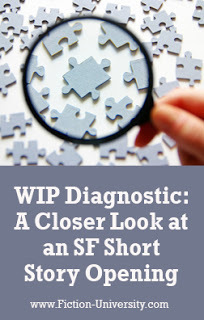 Critique by Maria D'Marco
Critique by Maria D'Marco WIP Diagnostics is a weekly column that studies a snippet of a work in progress for specific issues. Readers are encouraged to send in work with questions, and we diagnose it on the site. It’s part critique, part example, and designed to help the submitter as well as anyone else having a similar problem.
If you're interested in submitting to WIP Diagnostics, please check out these guidelines.
Submissions currently in the queue: Zero
Please Note: As of today, critique slots are open.
This week’s questions:
I'm wondering about the voice of the narrator. Is it funny, hokey, overdone, stupid? In short, does it work? There's some spots where the narrator is telling rather than showing, but in 1st person, it often seems more realistic to 'just say it.' Do you agree? And the practical stuff: Do you want to read the rest of the story? Would you want to read more stories told by this narrator? Did it make you start to chuckle?
Market/Genre: Science Fiction Short Story
On to the diagnosis…
Continue ReadingWritten by Janice Hardy. Fiction-University.com
Published on March 06, 2021 04:08
March 5, 2021
Story Structure: How the Midpoint Reversal Works in a Novel
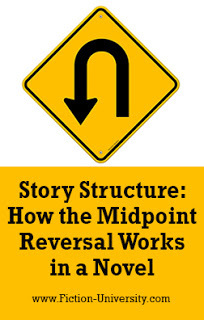 By Janice Hardy, @Janice_Hardy
By Janice Hardy, @Janice_HardyThe midpoint reversal is the glue that holds the first and second halves of the novel together.
Like many writers, I used to hate middles. My novels always bogged down halfway through, the plot hit a wall, or I realized it had gone so far off track I was writing a different novel. I can’t tell you how many times I just chucked the whole draft and started over.
Until I discovered the midpoint reversal, and it changed my writing life.
After that, middles weren’t a problem anymore, and plotting became a whole lot easier. I didn’t bog down or fizzle out, and I always knew where my plot was headed.
A strong midpoint reversal just flat out makes a novel easier to write.
Continue ReadingWritten by Janice Hardy. Fiction-University.com
Published on March 05, 2021 03:00
March 4, 2021
Tips on Writing "The Boring Stuff" Readers Tend to Skip
 By Jenna Harte
By Jenna Harte
Part of The How They Do It Series
JH: Readers skim when they read, especially if nothing is really going on in the story. Jenna Harte shares tips on keeping readers engaged in your novel.
Jenna Harte is a die-hard romantic writing about characters who are passionate about and committed to each other, and frequently getting into trouble. She is the author of the Valentine Mysteries, the first of which, Deadly Valentine , reached the quarter-finals in Amazon’s Breakthrough Novel Award in 2013. She has a contemporary romance series, Southern Heat, and a cozy mystery series, Sophie Parker Coupon Mystery Series.
Romance authors can join her free writing community for support, accountability and more at WritewithHarte. Jenna loves talking to anyone and everyone about romance fiction. You can join her free romance fiction reader community, SwoonworthyHEA to talk romance with other readers.
Website | Goodreads | Facebook | Pinterest | Instagram | YouTube
Take it away Jenna...
Continue ReadingWritten by Janice Hardy. Fiction-University.com
Published on March 04, 2021 03:00



